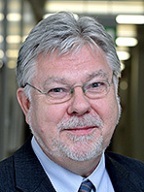Hans Georg Bock
Un. Heidelberg, Germany
Mixed-Integer Optimal Control – Theory, Numerical Solution and Nonlinear Model Predictive Control
Date: Monday, July 4, 2016 - 14:30-16:00
Venue: Building CW, ground floor, Aula
| Hans Georg Bock | Interdisciplinary Center for Scientific Computing (IWR), Un. Heidelberg, Germany |
|---|---|
|
Hans Georg Bock is a Professor at the Interdisciplinary Center for Scientific Computing of Heidelberg University and the head of the center since 2005. He is the chairman of the national program “Mathematics for Innovations in Industry and Business” of the German Federal Ministry for Education and Research and co-chair of the national strategic “Committee for Mathematical Modeling, Simulation and Optimization” (KoMSO). His special research interests are on numerical methods for DAE and PDE modelled processes, their simulation, optimization and especially optimal control with applications in science and engineering, and has collaborated extensively with industry companies like Daimler, BASF and ESA. He is coordinator a large collaborative research project on MSO for Improved Diagnosis and Therapy of Sepsis funded by the Klaus Tschira Foundation. He received two honorary doctorates, from the Russian Academy of Science and the Vietnam Academy of Science and Technology, and he is a member of the Heidelberg Academy of Sciences and Humanities. In 2011, he won an ERC Advanced Investigator Grant for “Optimizing Control – from a Vision to Industrial Reality”. He is co-editor of three Springer book series and a member of several editorial boards. His scientific oeuvre comprises over 200 publications and more than 50 completed PhD theses. |
|
| Mixed-Integer Optimal Control - Theory, Numerical Solution and Nonlinear Model Predictive Control |
|---|
|
The presentation discusses theoretical and numerical aspects of optimal control problems with integer-valued control variables. Despite the practical relevance and ubiquity of integer or logical decision variables such as valves, gears or the start-up of sub-units in chemical plants, optimization methods capable of solving such nonlinear mixed-integer optimal control problems (MIOCP) for large-scale systems and in real-time have only recently come within reach.
Nonlinear MIOCP such as the minimum energy operation of subway trains equipped with discrete acceleration modes were solved as early as the late seventies for the city of New York. Indeed one can prove that the Pontryagin Maximum Principle holds which makes an indirect solution approach feasible. Based on the “Competing Hamiltonians Algorithm” (Bock, Longman ’81), open loop and feedback solutions for problems with discontinuous dynamics were computed that allowed a tested reduction of 18 per cent in traction energy. However, such "indirect" methods are relatively complex to apply and numerically less suitable for large-scale real-time optimization problems. We present a new "direct" approach based on a functional analytic approach leading to a relaxed problem without integer gap, the so-called “outer convexification” which is then solved by a modification of the direct multiple shooting method as an "all-at-once" approach. Moreover, it can be arbitrarily closely approximated by an integer solution with finitely many switches. The gain in performance is enormous, orders of magnitude of speed-up over a state-of-the-art MINLP approach to the discretized problem, where the NP hardness of the problem is computationally prohibitive. Real-time applications by a “multi-level real-time iteration” NMPC method for on-board energy optimal cruise control of heavy duty trucks and minimum time control of a race car around the Hockenheim race track are presented. (Presentation based on joint work with F. Kehrle, C. Kirches, E.A. Kostina, R.W. Longman, S. Sager and J.P. Schlöder). |




